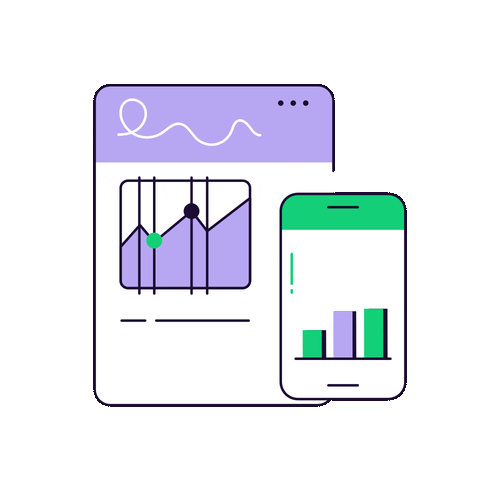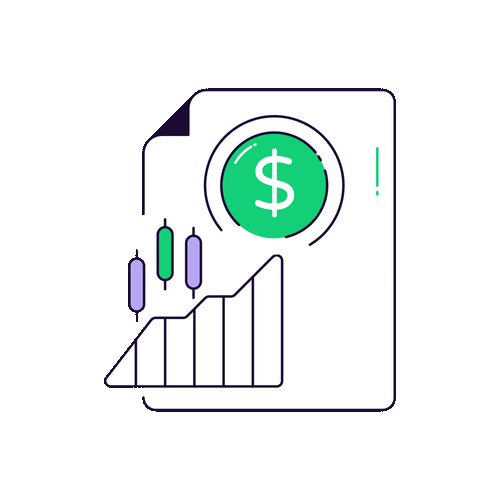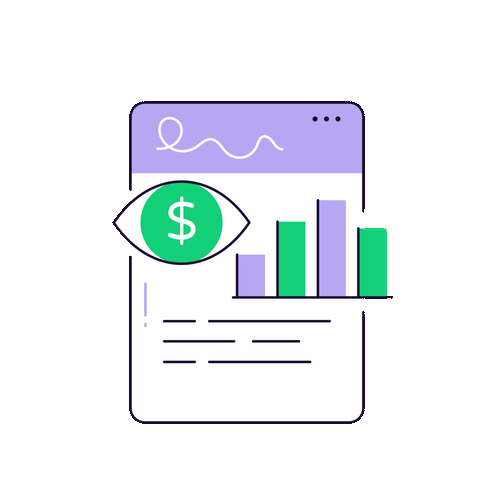Choose Your Investments: With the Self-Directed Investment Portal, you can trade a curated selection of exchange-listed stocks and ETFs with comprehensive market data and charting tools and zero commissions on any trade and no fees on buys.
Easy-To-Use Trading Experience: The InvestiFi* Self-Directed Investment Portal offers a simple, straightforward trading experience designed for both new and experienced traders.
Own a Piece of the Company: Purchase stocks in “shares.” Each share of stock is a unit of ownership in a company. Owning shares means you have a portion of the company’s equity. Share prices are continuously fluctuating.
React to Market Changes Promptly: Execute buys and sells quickly and efficiently inside the Self-Directed Investment Portal with prompt order processing in near-real time. React and respond to market changes with swift action and minimal delay.
Invest with Confidence: Get timely market insights and the latest financial news powered by Yahoo Finance inside the Portal to help assist your investment management and stock and ETF (Exchange Traded Funds) purchases.
What is securities trading?
Securities trading refers to the buying and selling of tradable assets such as stocks, bonds, and other financial instruments. Securities traders aim to generate profits by making strategic purchases and trades, often working independently or as part of a larger firm like an investment bank or private equity firm.
What is a security?
In investing, a “security” is an investment instrument such as a stock or bond.
What are the different types of securities?
There are a number of different types of securities, which include:
- Stocks: (Equities): Represent ownership in a company and offer potential for capital gains and dividends.
- Bonds: Represent debt obligations of entities like governments and corporations, providing periodic interest payments and return of face value at maturity.
- Mutual Funds: Pooled investment vehicles managed by professionals, offering diversification by investing in a basket of securities.
- Exchange-Traded Funds: (ETFs): Investment funds traded on stock exchanges, often tracking specific indexes or sectors.
- Real Estate: Investing in physical properties, either directly or through Real Estate Investment Trusts (REITs).
- Commodities: Investing in physical goods like metals, energy, or agricultural products.
- Cash and Cash Equivalents: Savings accounts, money market funds, and other highly liquid, low-risk assets.
What is the difference between saving and investing?
Saving typically involves placing money in a low-risk, liquid account, such as a savings account or a money market fund, with the goal of preserving capital and earning a small return. Savings accounts are almost always insured.
Investing, on the other hand, involves placing money in assets that have a higher potential for growth, such as stocks, bonds, or real estate, with the goal of generating returns over the long term. Investing involves taking on more risk to potentially achieve higher returns, and can sometimes result in the loss of principal.
What is risk tolerance?
Risk tolerance is the level of risk an investor is willing to take given the inherent volatility in the value of their investments. It is a quantifiable measure of the amount of loss an investor is prepared to accept within their investment portfolio. Factors such as age, investment objectives, and income may play a significant role in determining a specific investor’s risk tolerance.
What are the risks of investing?
The risks of investing include (but are not limited to) the following:
- Market Fluctuations: Stock prices can fluctuate rapidly, leading to significant losses.
- Volatility: Investments can experience sudden and unpredictable changes in value.
- Economic and Political Events: Economic downturns, political instability, and regulatory changes can impact investments.
- Regulatory Changes: Changes in laws and regulations can affect investment strategies and returns.
- Interest Rate Changes: Changes in interest rates can impact bond values and returns.
- Liquidity Risks: Investments may not be easily convertible to cash.
- Counterparty Risks: Risks associated with the creditworthiness of counterparties in derivatives and other financial instruments.
- Operational Risks: Risks associated with the management and operations of investments.
The foregoing risks are not all-inclusive. Any investment in securities involves the possibility of financial loss that investors should be prepared to bear. The price of any security can decline for a variety of reasons outside of an investor’s control. When evaluating risk, financial loss may be viewed differently by each investor and may depend on many different risk items, each of which may affect the probability of adverse consequences and the magnitude of any potential losses.
What is diversification?
Diversification is a strategy to manage risk by spreading investments across different asset classes and within those classes. This approach can help to:
- Reduce Risk: By investing in a mix of assets, you can minimize the impact of a poorly performing asset.
- Enhance Stability: Diversification limits fluctuations in your portfolio, reducing volatility.
- Optimize Returns: By capturing gains from different sources, you can maximize your potential returns.
How can I create a diversified investment portfolio?
To create a diversified investment portfolio, an investor can consider the following:
- Diversify Across Asset Classes: Include a mix of stocks, bonds, real estate, commodities, and cash equivalents to reduce overall portfolio risk.
- Diversify Within Debt: Allocate debt investments across different credit qualities (government, high-quality corporate, high-yield) and durations (short-term, long-term).
- Diversify Within Equity: Spread stock investments across sectors, industries, and investment themes to reduce company-specific and sector-specific risks.
- Determine Appropriate Asset Allocation: Set target allocations for each asset class based on your investment objectives, risk tolerance, and time horizon.
- Regularly Rebalance: Periodically rebalance the portfolio to maintain the target asset allocation as market conditions change.
- Consider Non-Correlated Investments: Include investments whose prices do not ebb and flow with the daily gyrations of stock market indexes, such as bonds, CDs, gold, cryptocurrencies, and real estate.
- Focus on High-Quality Companies: Hold a mix of high-quality companies across various sectors and industries. High-quality companies for investing are characterized by strong profitability, financial strength, stable business models, high-quality management, and attractive valuations.
- Monitor and Adjust: Continuously monitor the portfolio and adjust it as needed to maintain the target asset allocation and minimize risk.
By following these steps and including a mix of securities, you can build a diversified investment portfolio that can help manage risk and optimize returns over the long term.
What is a stock index?
A stock index is a statistical measure that tracks the performance of a group of stocks, representing a particular market or sector. Stock indexes are used as benchmarks to evaluate the overall performance of market, specific sectors or specific industries within the market. Examples of well-known stock indexes include the S&P 500, Nasdaq Composite, and Dow Jones Industrial Average.
Can I place a trade at any time?
No, trades can only be placed during market hours, 9:30 AM – 4:00 PM Eastern time on non-holiday weekdays. InvestiFi Securities and RQD do not permit after market hours orders.
Can I trade on holidays and stock market half-days?
No, trading will be closed for the following upcoming US market holidays. You won’t be able to trade on these days.
US Market Holidays
- New Year’s Day
- Martin Luther King, Jr. Day
- President’s Day and Washington’s Birthday
- Good Friday
- Memorial Day
- Juneteenth
- Independence Day
- Labor Day
- Thanksgiving Day
- Christmas
Bank Holidays
Banking holidays may affect settlement times and cash transfer times. In addition to stock market holidays, the following upcoming US bank holidays are: Indigenous Peoples’ Day-Columbus Day and Veterans Day.
US Stock Market Half-Days
Stock market trading will close at 1 PM ET on the following upcoming US market half-days:
Day before Independence Day,
Native American Heritage Day, the day after Thanksgiving Day and the Day before Christmas.
How long does it take my investment to show in my account after a purchase?
Buy orders are executed in near real-time. For buy orders, you will see your investment reflected in your portfolio within a few minutes after purchase. With sell orders, you will typically see the proceeds from your sale around two business days from the date the order was executed.
Can I sell my stock immediately after I buy it?
No, cash accounts can’t trade with unsettled funds. The settlement period is the time it takes stocks or cash to reach their new destination after a transaction is executed. Settlement typically occurs the next business day but could take up to two business days.
Can I cancel my order after I’ve placed it?
No. Since all trades are market orders, they typically cannot be canceled once the order is placed. For more information please review the InvestiFi Securities Customer Agreement.
What happens when you buy or sell a stock?
When you buy a stock, you are purchasing a share of ownership in a company. The money you pay goes to the person or institution selling the stock, not directly to the company. Companies initially sell stocks to raise funds, but after that, the stock trades between investors on the stock exchange.
When you sell a stock, you are selling your ownership stake to another investor. The money you receive from the sale goes to you, not the company. Companies do not buy back their own shares from individual investors – the shares are traded between investors on the stock exchange.
The stock price is determined by the supply and demand of the stock on the exchange. As more investors want to buy the stock, the price typically goes up. As more investors want to sell, the price typically goes down. However, a number of factors can affect the price of a stock.
How are stock prices determined?
Stock prices are determined by the interaction of supply and demand in the market. Factors that influence stock prices include a company’s financial performance, industry trends, economic conditions, investor sentiment, and market news and events. Stock prices are constantly changing as investors buy and sell shares based on their assessment of a company’s future prospects and the overall market conditions.
What is an Exchange-Traded Fund (ETF)?
An exchange-traded fund (ETF) is an investment fund that is traded on a stock exchange, like individual stocks. ETFs are designed to track the performance of a specific index, sector, or asset class, such as stocks, bonds, or commodities. ETFs allow investors to get exposure to a wide range of assets within a single security.
What are dividends?
Dividends are cash payments made by a corporation to its shareholders out of the company’s profits or retained earnings. Key points about dividends:
- Cash dividends are the most common form of payment and are paid out in currency, usually via electronic funds transfer or a printed paper check
- Many companies issue dividends on a regular basis, typically quarterly
- Dividends are typically issued as either a flat number (e.g. $2 per share) or as a percentage of the stock price
- The payment of dividends is not mandatory and is at the discretion of the company’s board of directors
- Dividends are allocated as a fixed amount per share, with shareholders receiving a dividend in proportion to their shareholding
- Dividends provide shareholders with a return on their investment and can offer at least temporarily stable income
- Dividends are paid out per share, so the more shares an investor owns, the more they will receive when the company issues dividends
- Dividends are not classified as an expense on the income statement but rather a deduction of retained earnings on the balance sheet
- Preferred stocks have priority claims on a company’s income for dividend payments
Is there a minimum amount of money I can invest?
The minimum buy order amount is $1.00. And, minimum sell orders are only $1.10.
Can I buy a fractional share of a stock?
Yes, you can buy fractional shares as low as $1.00.
Can I transfer outside assets into the investment portal?
Yes. Please contact InvestiFi Securities, your broker-dealer, to receive an Account Transfer Form. Please have ready your most recent account statement for the assets you wish to transfer.
call 1-888-255-2740
Are my investments taxable?
Your financial institution does not provide tax advice. For specific questions, you should consult a tax professional. You can find your consolidated transaction history in the documents section of the investment portal which can be used as a record of gains and losses received from trades.
Where are my investments stored?
The cash and securities are held in your brokerage account at a qualified custodian, RQD* Clearing LLC. RQD is the executing broker of trades and custodies assets of all customers on behalf of InvestiFi Securities. Please review your InvestiFi Securities customer agreement for more information.
Can anyone trade securities?
Only members over the age of 18 and in good standing with Frankenmuth Credit Union can buy/sell/hold securities. Commercial accounts may not be used.
What happens to my portfolio if I close my FCU account?
You will have to either sell or liquidate all of your account positions or transfer whole shares to another broker-dealer before you close your credit union membership. Otherwise, you will need to speak with InvestiFi Securities regarding trades in your brokerage account after your credit union account has been closed. Please see the InvestiFi Securities Customer Agreement or speak with a InvestiFi Securities for more information on closing your account.
call 1-888-255-2740
Buy and sell transactions and dividends paid are only able to be posted to a checking account at Frankenmuth Credit Union. Closing the checking account will result in 1) the inability to place an order to buy a security and 2) sell transactions and dividends not being deposited to your Credit Union account
Why did I receive a deposit even though I didn’t sell an asset?
Depending on the assets you hold, you may receive dividends or cash disbursement due to a corporate action. You may also receive a return of cash that is excess funds left over by a purchase of an asset.
What if I opted out of Crypto? Can I still trade?
If you opted out of Crypto you can still use the Self-Directed Investment Portal if you opt back in using the form below. Note, if you opt in to the Self Directed Investment Portal, you will see the Crypto Portal and Crypto assets upon login.
What support is available?
For brokerage-related questions, please email support@investifisecurities.co or call 1-888-255-2740. We are equipped to address general inquiries and assist with the resolution of technical issues. We do not and are not able to provide financial or tax advice/consultation.
I received an email—or phone call—about my Security purchase, how can I tell if it is legitimate?
Members will receive emails in accordance with regulations from InvestiFi Securities, AdvisiFi or RQD Clearing or phone calls from InvestiFi Securities. Examples of those communications include:
- AdvisiFi will email you if there are material changes to regulatory related communications such as the Customer Relationship Summary or the Disclosures Brochure. They will also contact you if there are questions about your investment profile.
- InvestiFi Securities will email or call you if there are servicing related questions including clarification of questions answered during onboarding.
- RQD will email you to notify you that your statement and / or confirmation is ready for review. If you ever have questions about the legitimacy of a call or email, you can reach Frankenmuth CU directly and we will connect you to the appropriate contact.
and RQD* Clearing LLC (“RQD”), SEC-registered broker-dealers and members FINRA/SIPC. AdvisiFi, InvestiFi Securities and RQD are not affiliates of Frankenmuth Credit Union (FCU). The Financial Institution does not provide investment advisory or brokerage services, and nothing on this website should be considered an offer, solicitation of an offer, or advice to buy or sell securities or investment products or to open an investment account. Cash and securities held by RQD are (1) not insured by the FDIC, NCUA or other government agency, (2) not guaranteed, (3) not Frankenmuth Credit Union deposits or obligations, and (4) may lose value. Securities and investments offered by InvestiFi Securities involve risk, including possible loss of principal. Brokerage services are available only to residents of the United States and in jurisdictions where InvestiFi Securities is registered. Please visit [InvestiFi.co/legal] for applicable terms, conditions and important disclosures.














